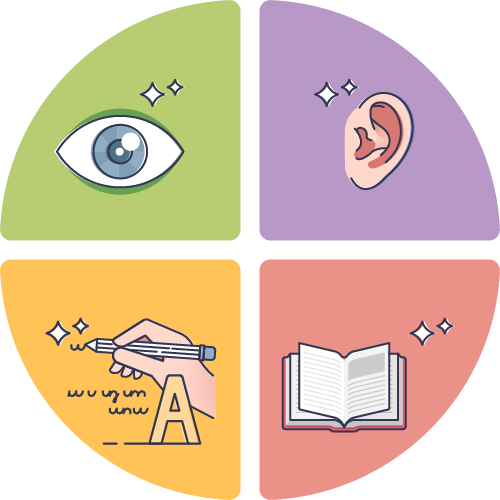Learning a new language can be a thrilling adventure, but it can also feel like a difficult climb up a steep slope.
Whether you're thinking of mastering Korean, Chinese, French, or any other language under the sun, motivation will play a big role in determining your failure or success.
In this article, we're going to talk about motivation, both from the outside (extrinsic) and deep within (intrinsic). I’ll also offer some of the best language-learning tips that you can adopt for 2024 to supercharge your language-learning journey.
I am a Korean language learner as well so I will input some of my experiences into the mix. Without further ado, let’s discuss the first language-learning tip of the day:
1) Find your extrinsic and intrinsic motivation to learn a new language

Motivation drives people to do something they want or choose to do. Think of motivation as a car's engine (coincidentally, we will see a CAR acronym later on). Without motivation or the “engine”, a person will find it difficult to progress or move forward.
Motivation can be divided into two main categories: extrinsic and intrinsic motivation.
Extrinsic motivation can be things like external rewards e.g. good grades, money, etc. Right now, I’m studying Korean really hard so I can finally get my TOPIK (Test of Proficiency in Korean) Level 6, the highest level achievable.
Whatever your external reasons for learning a new language may be, they can be powerful drivers to push you to improve yourself. However, extrinsic motivation tends to fade away once the reward is gone or achieved.
I can already imagine myself letting my Korean language skills rot away once I attain a TOPIK Level 6 since I will have reached my goal already. 🙃

Intrinsic motivation, on the other hand, is like the fuel that keeps your engine running long after the external rewards have faded. It's the joy, passion, and personal satisfaction you derive from the act of learning a new language.
Some examples of intrinsic motivation to learn a new language can be for personal growth where you see learning a new language as a way to improve yourself. Or you feel connected to the culture and want to learn the language to get a deeper understanding.
Or maybe you desire to connect with natives and find intrinsic joy when you form meaningful relationships with them.
Such reasons to learn a new language tend to keep you motivated over the long haul. When a person feels completely intrinsically motivated to learn, we say that the person is “self-determined”.
In fact, it is possible to create an environment for yourself to feel self-determined based on a known scientific theory called the Self-Determination Theory. You need to feel competent, autonomous, and related (or CAR in short).

In the next sections, we will look at many different language-learning tips that you can use to increase your feelings of CAR so you will feel intrinsically motivated to learn a new language for a long time!
2) Building up your COMPETENCE

Do you remember the last time you felt discouraged by not being able to finish a task because you weren’t skilled enough? Chances are, you probably lost the motivation to go back to it after that.
Competence in a new language is important to maintain your motivation to learn. Of course, we all start from scratch but here are some language-learning tips that you can adopt to improve your proficiency in whatever language you are learning.
Reading skills
So, to improve your speaking skills, you will have to… (drum roll)... SPEAK. (ba dum tss!)
Unfortunately, magic pills for improving speaking skills simply do not exist. The true key to mastering speaking is to speak as much as you can.
With today’s modern technology, you can start connecting with natives with a click of a button.
Hilokal is an app/website that allows you to practice speaking with natives, teachers, and students. You can enter into different rooms where you can talk to other users learning or teaching their target languages in a conference call-like environment.

If you find speaking to natives intimidating, then using Hilokal to practice can be a good starting point. It’s definitely less scary to speak online compared to meeting face-to-face. Even if you don’t want to speak, you can hang around and hear others speak.
If you are not into talking to people, I recommend speaking out loud by yourself.
Watching foreign dramas can be a good way to learn common new phrases. Turn on foreign subtitles so that you can read the dialogue. Check the dictionary for words you are unsure of. Repeat the phrase ten times to yourself.
By doing this often, you actually train your lips and tongue’s muscle memory over time (yes, your tongue has muscle memory too), and when the need arises, you can speak confidently without getting your tongue-tied.
Reading

In my opinion, being good at reading a foreign language comes down to being proficient in the writing system of the target language. So how do you become truly proficient? Learn the new language WITHOUT romanization whenever possible.
Many foreign languages have their own writing system. For example, 한글 (hangeul) is the Korean language’s writing system. Many beginners try to learn 한글 (hangeul) through romanization but that is actually a really bad idea. Let me demonstrate what I mean.
You are learning how to say “you can’t” in Korean and you see the following written in your notes:
안 돼요. (andwaeyo) - You can’t.
And way yo? An dwa eyo? For a beginner, it will be confusing, won’t it?
Fortunately, I had a great Korean teacher at the beginning of my Korean learning journey who taught me pure Korean and that helped me master 한글 (hangeul) very quickly and accurately.
Without romanization, you train your brain to read the foreign characters as they are and it makes reading much faster. It can also improve your pronunciation since romanization may not be able to fully represent certain sounds in a foreign language.
Once you have mastered the writing system completely, move on to build your vocabulary and grammar. You need to be able to understand what you are reading after all. After some time, you will find reading the foreign language a walk in the park.
Listening

Listening is probably one of the more difficult skills to master but it’s not impossible. Just like speaking, it requires repetitive training.
You can consider using foreign dramas again to practice your listening. Watch a portion (like 30 seconds) of your favorite drama at normal speed without subtitles. Try to understand what was said.
If you don’t understand the conversation, restart the clip and turn on foreign subtitles. For words that you are unsure of, you can check the dictionary. Once you have completed the above steps, turn off subtitles and repeat the clip again to see if you can finally understand it.
Listening also goes hand-in-hand with speaking so if you want to use Hilokal as your method of practicing listening, that’s fine as well! In fact, it will make listening more fun and interactive since you will be talking with an actual person.
Writing

This is one skill that I find easiest to practice and probably the most fun. In fact, I literally write Korean every day.
By the way, I’m not talking about paper and pen writing; I’m talking about typing in the target language's script or using a foreign language keyboard layout.
With almost everything going digital and paperless, I find myself using the pen less often and relying more on the keyboard.
(But of course, learn some basic pen and paper writing skills just in case you need them in the future, like when you are preparing to take foreign language exams)
So, if you want to practice writing, you need to first learn how to type in a foreign language. Once you have mastered that, I HIGHLY recommend looking for a native to do a language exchange where you can text each other every other day.
Language exchange not only encourages continuous conversation, it can also help you build meaningful relationships which can further boost your motivation to keep learning the language. You will begin to see a vast improvement in your writing if you remain diligent.
If you are not really the social kind, you can try conversing with Artificial Intelligence. ChatGPT is ultimately an AI-powered language model so it can handle day-to-day questions and answers very well.

Try copying and pasting the following prompt in ChatGPT and have a chat with it:
“I want you to take on the role of a (Korean, Japanese, Chinese, etc.) friend and respond to my prompts as they would.”
There are limitations to using A.I. to practice writing. You can only ask generic questions and sometimes A.I. can be a little wonky with their answers, but it beats not having an avenue to practice at all.
3) Finding a community or friends to learn with (RELATEDNESS)

To keep you motivated to learn a new language, it’s important for you to feel connected to and supported by a community. As the saying goes, no man is an island. Even rats in a science lab require social interaction with other rodents, what more us humans.
Let’s explore some tips that can help you build social connections in today’s modern context.
Online
Social media is a powerful tool to connect with like-minded individuals. You can even share your language-learning journey on social media and build a supportive community along the way.
You can consider starting a social media account to document your learning progress. Comments and attention from the community can help you feel encouraged to keep learning.
However, I have to warn against making a large following the primary goal. That in itself is an extrinsic motivation and might even be a source of discouragement if you end up getting only 10 followers on your account. Oops…
Another effective way to immerse yourself in a community is to seek out interest groups related to topics you're already passionate about but in the target language that you are learning.
For myself, I'm an avid gamer. So, I decided to turn gaming into an opportunity to practice Korean. Instead of playing with English-speaking players, I challenge myself to join Korean servers, where I get teamed up with native Koreans.

Of course, in gaming, matches can get intense, and let's just say the language used can be quite colorful at times. BUT, at least I get to practice speaking Korean while gaming, and I've even made some great Korean friends through it.
There are plenty of interest groups online that you can search for online and they are not limited to online activities like gaming. Look what I found on Facebook just by doing a simple search in Korean: a plant interest group
Offline
Making connections offline might not be for everyone but if you can pull it off, it will be very rewarding.
Your language exchange friends can be a great offline support system if they happen to live near you. Essentially, they are your friends and you can always hang out with them for other reasons outside of language exchange.
If you can afford it and want to be adventurous, you can try traveling to your country of interest. Traveling alone is probably one of the best ways to make spontaneous connections and by traveling to your country of interest, you can be certain of meeting natives there.
Alternatively, if you prefer something more organized, you can consider taking offline lessons. You don’t just get to learn the language, you get to make friends along the way and these friends can be a great source of offline support.
4) Choosing how and what you want to learn (AUTONOMY)

When one is given choice and control over their actions, it promotes long-term motivation since the individual will feel their actions have direct consequences to their own growth and development.
This principle can also be applied to language learning in several ways. Let’s explore some useful language-learning tips that can help increase your sense of autonomy.
How do you learn?
In education, different learning styles exist. One student may learn well visually while another may learn well simply by listening. You may even be a mixture of both! That’s why it’s important to know what your learning style is.

As a self-determined student, you should get to choose the best way to learn. There are 4 learning styles: visual, auditory, read and write, kinesthetic.
Visual
Visual learners learn well with images and pictures. You can learn vocabulary with image flashcards. Or you can learn by watching visually stimulating foreign shows or dramas.
Auditory
Auditory learners learn best while listening. Such learners can consider listening to foreign language learning podcasts on Spotify. Repeating words out loud to yourself can also be a form of auditory learning.
Read and write
These learners thrive well in the traditional education system where paper and pen are valued. They can consume exercise books and textbooks like a champ.
Kinesthetic
These people learn well by doing. If you are such a person, travel to a foreign country! Go and experience the language you are learning in the real world. Or you can role-play with a friend and practice commonly used shopping phrases, or practise how to order food, etc.
Discovering the learning style that suits you best when tackling a new language is like finding your secret sauce for success. When you learn in a way that clicks, it not only boosts your current performance but also paves the way for future competence.
What do you want to learn?
This is an essential point for anyone wanting to pick up a new skill. You need to know what you want to learn in the first place and start learning from there.
Imagine going to a restaurant, and wanting to eat some delicious steak but the chef decides to serve you some boiled vegetables. I’m pretty sure you won’t be motivated to finish that…

Do you want to learn so you can communicate with natives? Learn conversational phrases and words.
Do you want to learn a language so you can get a job? Learn business-style phrases.
What you want to learn is very much closely related to WHY you want to learn so if you are not sure where to start, ask yourself the reason you are learning the language in the first place.
Once you have discovered what you want to learn, you look for the most suitable avenue or way to learn it.
For example, look for language exchange partners if you are looking to learn conversational phrases. Or look for schools offering formal lessons teaching business language skills.
In conclusion…
Language learning is a highly personal and adaptable journey. It's crucial to embrace your unique motivations and preferences, as well as to remain open to various methods and resources that resonate with you.
By doing so, you'll not only sustain your motivation but also pave the way for a rewarding and enduring language-learning experience. Remember, there's no one-size-fits-all approach; the key is to find what works best for you and stay committed to your goals!



